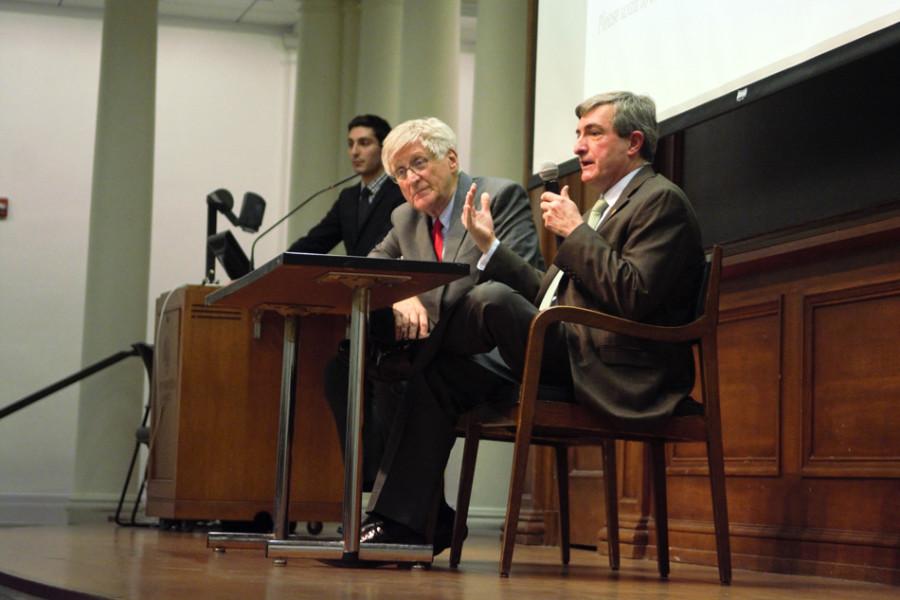Experts debate the future of nuclear energy at Fossil Free NU event
Lauren Duquette/The Daily Northwestern
Arnie Gundersen and Jordi Roglans-Ribas answer questions about nuclear energy at an event hosted by Fossil Free NU on Thursday night. Gundersen had issues with the safety and feasibility of nuclear power as an alternative energy source while Roglans-Ribas advocated for its use as a fossil fuel replacement.
May 1, 2015
Experts discussed whether nuclear power could be a viable source of alternative energy at an event hosted by Fossil Free NU on Thursday night.
The speakers told more than 50 students in Harris Hall that the United States and the rest of the world need to move from carbon emitting energy sources as quickly as possible.
“The operative word in this discussion tonight is ‘now,’” said Arnie Gundersen, chief engineer at Fairewinds Energy Education. “What are we going to do right now to reduce the amount of carbon in the atmosphere, what is NU going to do, what is America going to do, what is the globe going to do? We need ‘now’ solutions, not 20- to 30-year solutions down the road.”
Nuclear power is part of the solution, but there need to be shifts in its infrastructure before it becomes a viable replacement, said Jordi Roglans-Ribas, director of the nuclear energy division at Argonne National Laboratory.
“Because nuclear power plants cannot afford to shut down when another source is operating on the grid, there will need to be research and development to make nuclear power plants combine with a storage unit or combine with other things like industrial heating … (to) lower the costs of operation,” Roglans-Ribas said.
On the other end of the spectrum, Gundersen argued the dangers of disposing of nuclear energy waste make renewable sources of energy such as wind and solar the best options.
“Reaching a goal of hitting 20 percent of the world’s power through nuclear is just not feasible,” Gundersen said. “Renewables can do that, they are scaleable, unlike nuclear. We’ve already seen the renewable contribution grow about 7 percent in the last 10 years, to imagine it hitting 20 percent in 10 years is totally believable.”
Beyond issues of infrastructural feasibility, students asked questions during a Q&A period about the potential human toll on vulnerable populations if nuclear power plants are built in certain communities.
“Typically nuclear power plants have been placed in areas following the construction infrastructure, typically near sources of cooling such as rivers or the ocean,” Roglans-Ribas said. “Typically the communities around nuclear power plants want to keep them operating as they are a source of income for the community.”
Gundersen said he has seen high-paying jobs in the nuclear sector given to people outside of these communities while the residents are given other, lower-quality service jobs. He said he has also found a disproportionate amount of the land used for extracting uranium ore is in indigenous communities, such as those in Canadian provinces.
“I met with indigenous peoples in Quebec, and the economic and social costs of the mining of uranium on these poor Aboriginal cultures is really severe and saddening,” Gundersen said.
McCormick sophomore Beza Bisrat, who attended the event, said the development of new energy sources and its impact on people was important part of the discussion. In her view, economic development cannot be separated from the communities it affects.
“The issues that I’m really interested in, like hunger and poverty, they are affected by climate change,” Bisrat said. “They did a pretty good job of connecting the issue of climate change and nuclear power to these international scopes.”
Fossil Free NU’s event coordinator Noah Becker, a Bienen freshman, said he hoped the discussion informed students about the benefits and drawbacks of nuclear power.
“People will be engaged in a dialogue about sustainability, both related to nuclear and apart from it, and start to think about how they can take action and be involved,” Becker said.
Email: [email protected]
Twitter: @elenasucharetza












